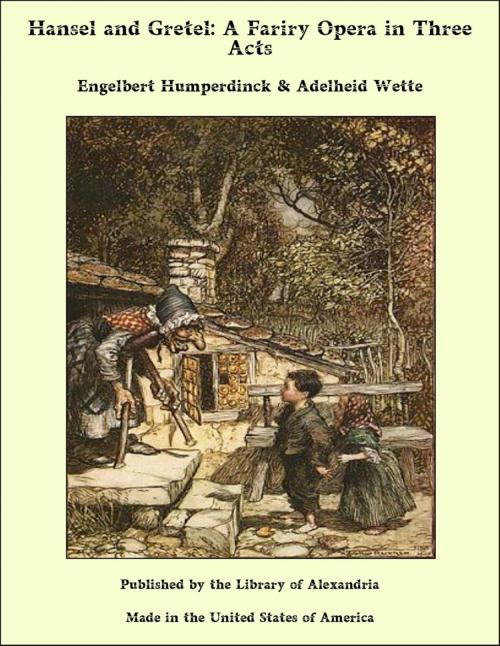Hansel and Gretel: A Fariry Opera in Three Acts
Nonfiction, Religion & Spirituality, New Age, History, Fiction & Literature| Author: | Engelbert Humperdinck & Adelheid Wette | ISBN: | 9781465612359 |
| Publisher: | Library of Alexandria | Publication: | March 8, 2015 |
| Imprint: | Language: | English |
| Author: | Engelbert Humperdinck & Adelheid Wette |
| ISBN: | 9781465612359 |
| Publisher: | Library of Alexandria |
| Publication: | March 8, 2015 |
| Imprint: | |
| Language: | English |
Hänsel and Gretel is an opera in three acts, the music by Engelbert Humperdinck and the libretto by Adelheid Wette. It is the German version of the old nursery legend—Babes in the Wood. The first scene discloses a wretched homestead. The two children, Hänsel and Gretel, are at work—the boy making brooms and the girl knitting stockings. They both complain of feeling very hungry, and there isn't a thing in the house. Yes, there's a jug of milk that will make nice blanc-mange when mother comes home. Hänsel tastes it and Gretel raps his fingers. He says he won't work any more and proposes they dance instead. Gretel is delighted. He is very awkward at first but she teaches him the steps and they are getting along so famously that they whirl around the room and fall exhausted on the floor. At this moment the mother enters and she is so angry at seeing them do no work that she boxes their ears for it. In her excitement she gives the milk pitcher a push. It falls off the table, breaks in pieces, and spills all the milk. At this she is beside herself and seizes a basket and tells the children to go to the wood and pick strawberries. They must not come home till the basket is full. They run off while she, weary of life, sits sobbing herself to sleep. The father is heard in the distance with a joyous song and enters in a joyful mood. He wakes up his unhappy wife to tell that he has sold all his brooms at the fair for splendid prices and he shows his basket full of provisions. Both are thus in fine humor when he asks where the children are. She says she sent them away in disgrace to the Ilsenstein. The Ilsenstein! he exclaims, where the witches ride on broomsticks and devour little children. Exclaiming "Oh horror!" she runs out of the house, he after her, to find Hänsel and Gretel. The second act shows a forest. Gretel is making a garland of wild roses while Hänsel is looking for strawberries. In the background is the Ilsenstein. It is sunset. Hänsel crowns Gretel queen of the wood and she allows him to taste a strawberry. He gives her one in return and little by little they devour them all. Then they are frightened. They want to pick more but it is getting too dark. They want to leave but cannot find the way. Gretel fears being in the dark but Hänsel is very brave. She sees faces in trees and stumps and he calls out to reassure her. Echo answers and he grows frightened too. They huddle together as a thick mist arises which hides the background. Gretel, terror-stricken, falls on her knees and hides behind Hänsel. At this moment a little man appears, as the mist rises, and quiets them. It is the Sandman and he sings them to slumber. Half awake they say their evening prayer and sink down on the moss in each other's arms. A dazzling light then appears, the mist rolls itself into a staircase and angels pass down and group themselves about the two sleeping children.
Hänsel and Gretel is an opera in three acts, the music by Engelbert Humperdinck and the libretto by Adelheid Wette. It is the German version of the old nursery legend—Babes in the Wood. The first scene discloses a wretched homestead. The two children, Hänsel and Gretel, are at work—the boy making brooms and the girl knitting stockings. They both complain of feeling very hungry, and there isn't a thing in the house. Yes, there's a jug of milk that will make nice blanc-mange when mother comes home. Hänsel tastes it and Gretel raps his fingers. He says he won't work any more and proposes they dance instead. Gretel is delighted. He is very awkward at first but she teaches him the steps and they are getting along so famously that they whirl around the room and fall exhausted on the floor. At this moment the mother enters and she is so angry at seeing them do no work that she boxes their ears for it. In her excitement she gives the milk pitcher a push. It falls off the table, breaks in pieces, and spills all the milk. At this she is beside herself and seizes a basket and tells the children to go to the wood and pick strawberries. They must not come home till the basket is full. They run off while she, weary of life, sits sobbing herself to sleep. The father is heard in the distance with a joyous song and enters in a joyful mood. He wakes up his unhappy wife to tell that he has sold all his brooms at the fair for splendid prices and he shows his basket full of provisions. Both are thus in fine humor when he asks where the children are. She says she sent them away in disgrace to the Ilsenstein. The Ilsenstein! he exclaims, where the witches ride on broomsticks and devour little children. Exclaiming "Oh horror!" she runs out of the house, he after her, to find Hänsel and Gretel. The second act shows a forest. Gretel is making a garland of wild roses while Hänsel is looking for strawberries. In the background is the Ilsenstein. It is sunset. Hänsel crowns Gretel queen of the wood and she allows him to taste a strawberry. He gives her one in return and little by little they devour them all. Then they are frightened. They want to pick more but it is getting too dark. They want to leave but cannot find the way. Gretel fears being in the dark but Hänsel is very brave. She sees faces in trees and stumps and he calls out to reassure her. Echo answers and he grows frightened too. They huddle together as a thick mist arises which hides the background. Gretel, terror-stricken, falls on her knees and hides behind Hänsel. At this moment a little man appears, as the mist rises, and quiets them. It is the Sandman and he sings them to slumber. Half awake they say their evening prayer and sink down on the moss in each other's arms. A dazzling light then appears, the mist rolls itself into a staircase and angels pass down and group themselves about the two sleeping children.















